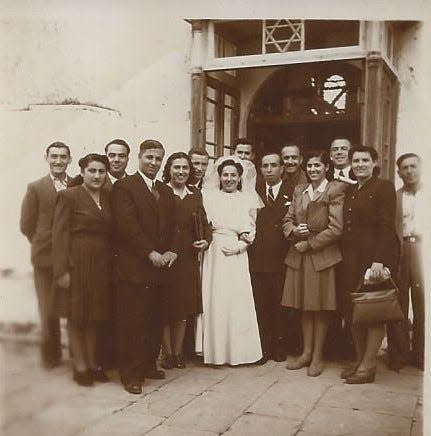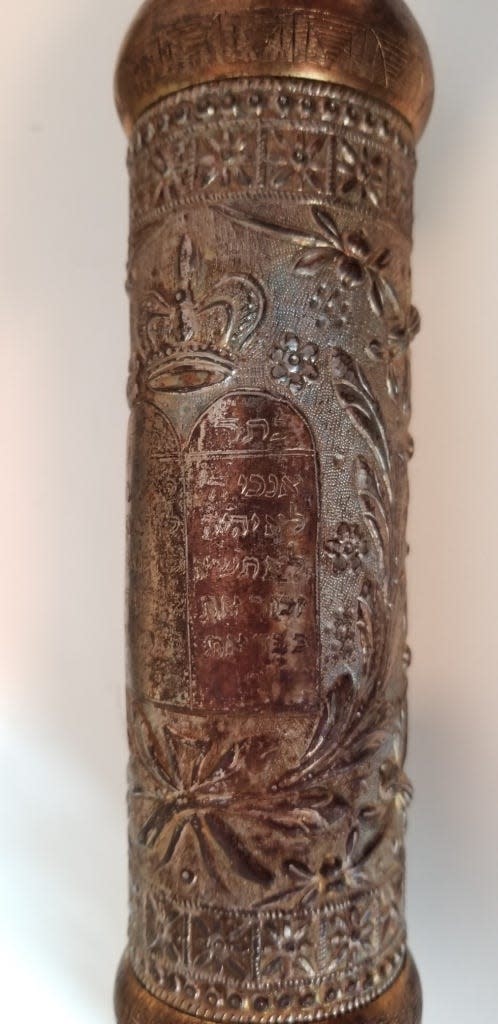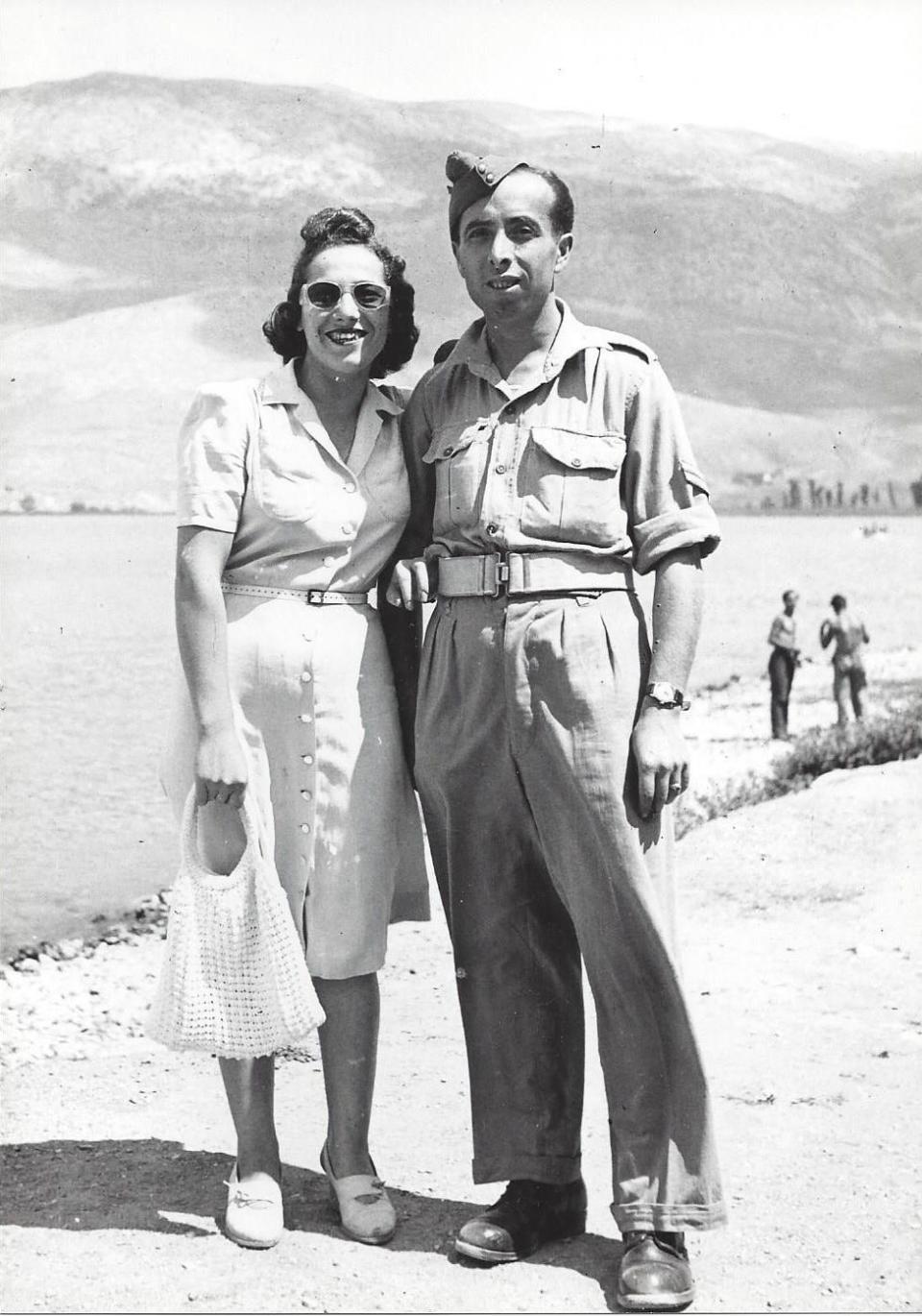Boynton man's grandparents perished in Auschwitz; his family's hidden heirloom has an extraordinary story

BOYNTON BEACH — Joseph Besca’s family rarely shared their story of surviving the Holocaust. But now, with the help of a sacred heirloom, the Boynton Beach resident is honoring their memory and preserving the past.
On March 25, 1944, more than a decade before Joseph Besca was born, Germans deported his grandparents and his father, Samuel, to the Auschwitz-Birkenau concentration camp in Poland, ripping them from their home in Greece. The family, which also included Samuel Besca’s brother and two sisters, shared their final moments at the killing center.
“He went to the right, they went to the left,” Joseph Besca said of his father. “He actually saw them walking toward the crematorium.”
The Germans forced approximately 1,900 Jews out of Ioannina, Greece, and into the camp. Fewer than 150 people survived, including his father, who endured abuse, hunger and uncertainty until the liberation of Auschwitz.
Samuel Besca then returned to his family home in Greece. There, he unearthed an item that his parents had buried outside for safekeeping: a silver case measuring about 14 inches long.
The megillah case — adorned with images of flowers, a crown and the Ten Commandments — held a sacred text known as the "Scroll of Esther," which recounts the story of Jewish deliverance in ancient Persia. Also known as the biblical Book of Esther, the scroll is usually read during Purim, a celebratory holiday that falls on March 6 and 7 this year.

And thanks to a recent donation by Joseph Besca and his brother, Mark, their father's treasured heirloom will now be archived by the U.S. Holocaust Memorial Museum and shared with the world.
“This megillah has an extraordinary history,” said Fred Wasserman, a museum acquisitions curator. “Its survival speaks to the continuity between generations despite the Holocaust, and powerfully echoes the Purim story of Jewish perseverance and survival that is recounted in the Scroll of Esther itself.”
"Let’s share this with the world." Besca family weighs decision to donate family heirloom
The heirloom, much like their father’s stories, had been kept inside the family for generations. Though he survived the genocide, Samuel Besca grappled with a lifetime of trauma and a distrust for others.
“He used to wake up in the middle of the night screaming,” his son said. “I didn’t understand why until he said, ‘I see the dogs. The German shepherds coming at me.’”
But his family's story is filled with blessings, too. Shortly after the liberation of Auschwitz, his father reunited with a woman named Matilda Besso, his high school sweetheart. A Christian family harbored Besso before she traveled to Palestine during the war. And after she reunited with Samuel Besca, they got married, opened a small store in Greece and then gave birth to Joseph, their first son, in 1956.

They later immigrated to New York in search of a better life for their new family. They found a tight-knit community of Jews and fellow Holocaust survivors, including many who, much like Samuel, were hesitant to relive their past.
"There were people in my family that refused to talk about the Holocaust until their later years, before they passed," Joseph Besca said. "It was too painful of a memory."
Samuel Besca and his wife had their second son, Mark, in 1959, giving Joseph a brother and best friend. And with their parents' passing — their father in 1996 and their mother in 2009 — the sons wanted to honor their family's story, both the good and bad.
'We need to be louder than hate': Officials, residents plot strategy to fight antisemitism
Lake Worth High teacher removed from class after 'disturbing,' 'racially charged' incident
Wild HOA board meeting boils over amid claims of forged signatures, unlawful imprisonment
Joseph Besca, now 66, and Mark, now 63, also wanted to ensure that history is preserved as more Holocaust survivors pass away each year.
"Mark and I talked about this at great length and we said, 'You know what? Let's share this with the world,'" Joseph said. "We have to teach this to every generation and we have to make sure it never happens again."
With an office in Boca, the Holocaust Museum races to preserve history
The family heirloom is now being housed at the David and Fela Shapell Family Collections, Conservation and Research Center. The center in Bowie, Md., less than an hour from the U.S. Holocaust Museum in Washington, D.C., is a two-story research and storage facility that holds a majority of the museum’s collection.
While many artifacts are on display at the museum itself, tens of thousands of items are researched and preserved at the center, which includes laboratories and a climate-controlled environment. Artifacts are sometimes rotated between the center in Maryland and the museum in Washington.
And every object that enters the collection, including the Besca family heirloom, is eventually digitized and uploaded to the museum’s website for all to see, said Robert Tanen, director of the museum’s Southeast Region.
“The unfortunate reality is that millions and millions of stories were snuffed out and will never be told,” he said. “Each story and each collection that’s donated to the museum is a new piece of this unfinished puzzle that we’ll have to build the story of the Holocaust.”
Tanen, whose office is based in Boca Raton, said the museum is racing to document the stories of Holocaust survivors and their families while the opportunity still exists.
“You can shake their hand,” he said of the remaining Holocaust survivors. “You can give them a hug. You can take a picture with them. Yet, right now, we’re experiencing a resurgence in antisemitism and Holocaust denial. Imagine what that’s going to be like when we don’t have survivors here to stand up and tell their stories."
“That makes donations like Mr. Besca’s that much more significant and important," he continued.
To view the museum's full collection online, visit www.ushmm.org. And anyone who wants to inquire about donating an artifact can send an email to curator@ushmm.org.
Giuseppe Sabella is a reporter covering Boynton Beach and Lake Worth Beach at The Palm Beach Post, part of the USA TODAY Florida Network. You can reach him at gsabella@pbpost.com. Help support our journalism and subscribe today.
This article originally appeared on Palm Beach Post: Boynton Beach man donates family heirloom buried during the Holocaust

